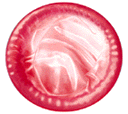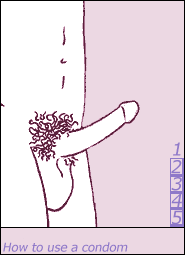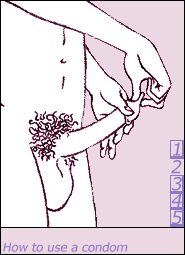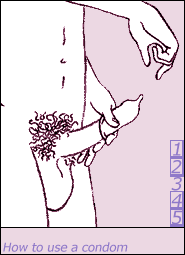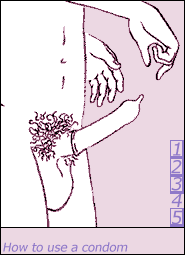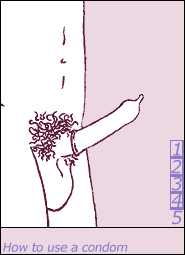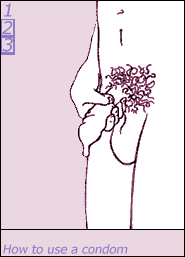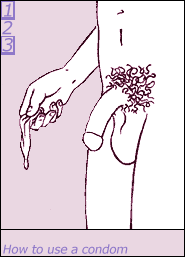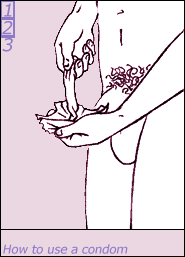
 |


|
Condom |
|
The Condom is a sheath of thin latex or plastic worn on the penis
during sexual intercourse. It is closed at one end with a teat.
It is 85-98% effective. Its effectiveness is increased if it is
used carefully. Its durability will be weakened if the condom is
damaged in some way, either through tearing it or using oil-based
lubricants. |
|
|
The condom is the only contraceptive to protect against STI's. Condoms work by collecting semen before, during, and after a man ejaculates. This means after a man "comes" from having sex, he produces semen and sperm, which can make a girl pregnant if no condom is used. The condom keeps sperm from entering the vagina (the female genitals). How to use a CondomThe condom is rolled onto the male penis when erect. The condom should be held inplace when the penis is withdrawn from the vagina to avoid leakage. |
|
1)Always use the condom when the penis is erect. 2)Gently squeeze the teat at the end of the condom, releasing any trapped air and at the same time making some space for the semen. 3)Place the condom at the penis and begin to roll it carefully down. 4)Continue to roll it down until the condom reaches the base. 5)It is now safe to have sex.
|
|
How to take it off1)Be sure to hold the base of the condom when withdrawing from the vagina.
2)Be careful when removing the condom, so as not to spill semen around the vagina.
3)Dispose of the condom. DO NOT REUSE IT.
|
|
|
Diaphragm |
|
The diaphragm is commonly known as the 'cap'. It is a dome of soft rubber that fits over the cervix inside the vagina. This forms a barrier, preventing the sperm coming into contact with the cervix. It must be inserted 2 hours before sex but should not be removed for at least 6 hours after intercourse has taken place. Must be removed within 24 hours. The diaphragm is ineffective if not used together with a spermicide (a chemical that kills sperm). Advantages
Disadvantages
|
 |
|
The Pill (COC) |
|
The Pill (Combined Oral Contraceptive Pill COC) is a combination of 2 hormones, oestrogen and progestogen. Protection is decreased due to upset stomach, diarrhea, and antibiotics/prescribed medication. Long-term use will not affect your ability to have a baby in the future. It can also help regulate periods, making them less heavy and can reduce pre-menstrual syndrome symptoms. Advantages
Disadvantages
|
 |
|
Progestogen Only Pill |
|
This contraceptive known as the 'mini-pill' contains one hormone: progestogen. The mini-pill is suitable for women who want an effective contraceptive but cannot take oestrogen. The mini-pill is also suitable for diabetics or women with high blood pressure, some heart problems and migraine. For the mini-pill to be effective you must take it at the same time every day. Protection against pregnancy may be reduced if you forget to take your pill, have an upset stomach or diarrhea. Advantages
Disadvantages
|
 |
|
Injectable Contraceptive |
|
The injectable contraceptive is a hormone called progesterone, which is given by injection every 12 weeks. It is most suitable for women who want an effective, simple to use method of contraception. After the last injection there may be a delay in the return to periods and fertility. Advantages
Disadvantages
|
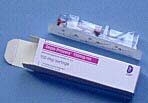 |
|
Intrauterine Device (IUD) |
|
Also known as the 'coil', this contraceptive is made from a small piece of plastic wound with copper. Intra-Uterine Contraceptive Device (IUD) works by interfering with the movement of the sperm after sexual intercourse. Secondly it alters the lining of the uterus (womb), making it difficult for an egg to become implanted inside the womb. Advantages
Disadvantages
|
 |
|
Sponge |
|
This is a polyurethane foam sponge, which contains a spermicide. It is inserted into the vagina, covering the entrance to the womb and is effective for 24 hours. However, it must be left in place for 6 hours after intercourse and removed 30 hours after it was put in place. Advantages
Disadvantages
|
|
Emergency Pill |
|
The emergency pill does exactly what it says. It is used in the event of no contraception being used during unprotected sexual intercourse. The morning after pill as its more commonly known can be taken up to 72 hours after sex. It can be obtained form your doctor or family planning clinic. Advantages
Disadvantages
|
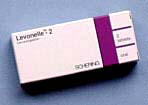 |

